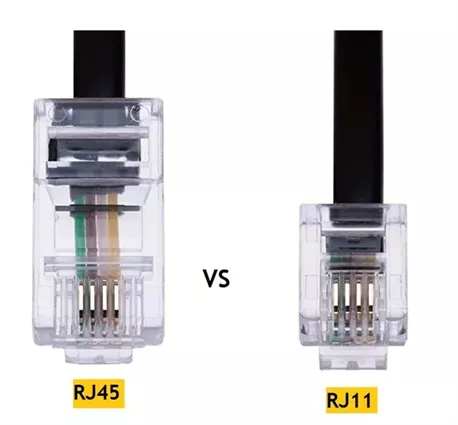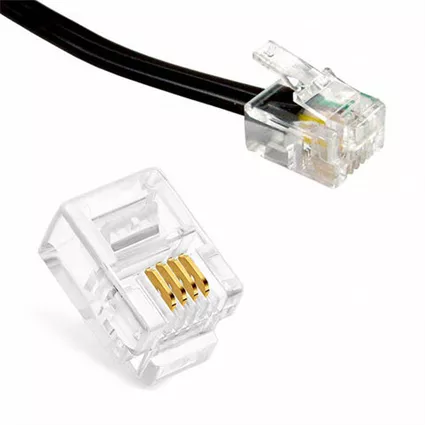OUTLINE:
Why Might You Use An RJ11 Connector? Our competent assistant
 171
171Ever heard of the humble RJ11 connector? It's that little plastic plug you might find on the end of your landline phone cord, the unsung hero of communication before Wi-Fi took over. But why might you use an RJ11 connector? Go ahead.

What Is An RJ11 Connector
An RJ11 connector, also known as a registered jack 11, is a type of modular connector commonly used for telephone lines and other low-voltage applications. It's a small, plastic plug with four or six pins that connect to a corresponding RJ11 jack.

Why Might You Use An RJ11 Connector
You might better use rj 11 connector in these situations:
- Connecting a landline telephone: This is the most common use for RJ11 connectors. They are used to connect a phone to a wall jack, which in turn connects the phone to the telephone network.
- Connecting a DSL modem: Some DSL modems use RJ11 connectors to connect to the phone line. This is less common than using an RJ45 connector, but it is still possible.
- Connecting other analog devices: In the past, RJ11 connectors were also used to connect other analog devices, such as fax machines and some early internet modems. However, these devices are becoming increasingly rare, and RJ11 connectors are no longer commonly used for them.
Differences Between The RJ11 And The RJ45
RJ11 and RJ45 connectors are both commonly used in communication technology, but they have several key differences. Here's a breakdown:
|
Purpose |
RJ45 |
RJ11 |
|---|---|---|
|
Purpose |
Primarily used for computer networking like connecting devices to routers or modems. |
Primarily used for telephone lines and other low-voltage applications like DSL modems and fax machines. |
|
Appearance |
Larger, with eight positions for wires. |
Smaller, with four or six positions for wires. |
|
Wires |
Typically has eight wires, used for transmitting and receiving data over multiple channels. |
Typically has four wires, often green and red for the two signal paths. |
|
Wiring Standards |
More complex wiring standards like TIA/EIA-568-B for different network configurations. |
Two main standards, T568A and T568B, for how to arrange the wires. Both ends of the cable must use the same standard. |
|
Compatibility |
Some RJ11 plugs can fit into an RJ45 jack, but functionality might be limited. |
An RJ45 plug is too large to fit into an RJ11 jack. |
Overall
RJ11: Simpler connector for analog voice communication.
RJ45: A more complex connector for high-speed data transmission in networks.
Cautions For Using An RJ11 Connector
By following the given guidelines, you can ensure the safe and effective use of RJ11 connectors, preventing damage to equipment and potential hazards.
- Choose the right connector: Make sure you're using an RJ11 connector and not an RJ45 (which is larger and has 8 pins instead of 4 or 6).
- Match the wiring standard: There are two main wiring standards for RJ11 connectors, T568A and T568B. Both ends of the cable must use the same standard for proper functionality. Most commonly used phones use the T568A standard.
- Wire colors: Typically, the wires are green and red for the two signal paths. However, other color combinations can be used, so double-check the wiring diagram for your specific application.
- Prepare the cable: If you're using a separate connector, strip about 1/2 inch of insulation from the end of each wire. Twist the strands of each wire tightly together.
- Insert the wires: Carefully insert the wires into the corresponding slots on the connector based on the chosen wiring standard. Make sure the twisted ends reach the bottom of the slots.
- Crimp the connector: Use the correct crimping tool for the type of connector you're using. Squeeze firmly to create a secure connection between the connector and the wires.
- Check for errors: Make sure the wires are inserted correctly and securely into the connector, and that there are no nicks or cuts that could compromise the connection.
- Test the connection: Once everything is connected, test the phone or other device to ensure it's working properly.
Conclusion
In conclusion, the RJ11 connector is a small but vital component of our home communication systems. It allows us to connect our phones, fax machines, and modems to the outside world and has played a crucial role in the evolution of modern communication. While newer technologies have largely replaced it for data networking, the RJ11 remains an important and widely used connector for telephone wiring. Why might you use an RJ11 connector? Because it helps us communicate with the world.

Disclaimer: The views and opinions expressed by individual authors or forum participants on this website do not represent the views and opinions of Chipsmall, nor do they represent Chipsmall's official policy.

share this blog to:

